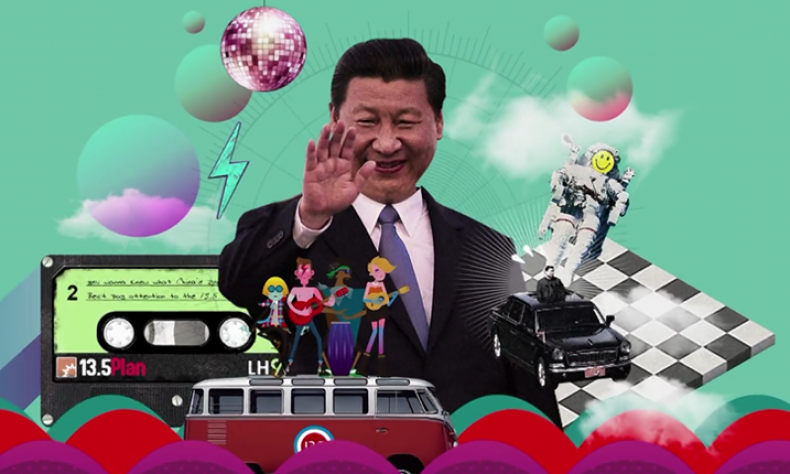
The Shisanwu Song: Viral Hit or Empty Vessel?
When the Chinese viral hit Little Apple was performed in the American Music Awards ceremony in November 2014, the cheesy-yet-catchy pop song by the Chopstick Brothers found a way to elbow into the global market. Now, China may have another hit viral video, but this time with a far more political message.
The cartoon music video is themed around China’s latest 13th Five-Year Plan and was promoted by Xinhua News Agency to coincide with the Fifth Plenary Session of the 18th CPC Central Committee which concluded in late October. The song soon picked up steam online, with reactions to the video mixed. Obviously, the song is easy to remember, and features American-accented singers, acoustic guitars, and a chorus that proclaims: “If you wanna know what China’s gonna do, best pay attention to the shísānwǔ (the Chinese name for the 13th Five-Year Plan).”
It does create a craze in Chinese social media, Sina Weibo and WeChat in particular. But what did foreign netizens think of the song?
On Twitter, the collective reaction was one of mirth and disbelief, with one commentator jokingly prescribing the video as therapy for depression while another astutely commenting that despite all the mockery, now hundreds if not thousands of Westerners are now informed as to what the 13th Five-Year Plan is and stands for. Or are they? As despite the song’s folksy catchiness, a number of netizens expressed bemusement as to what the song was all about. “@RobinBrown” replied to the repost of the video by People’s Daily by saying: “Can anyone explain 1) Who this is for? 2) Why it was made? 3) Why is it …well, so weird.” Indeed, once the video starting trending throughout the internet, most reactions on mainstream news organizations referred to the video as “bizarre and campy”, “trippy,” or “wacky,” words not usually associated with the traditional stoicism of the Chinese Communist Party.
Why so? In the video, frolicking hippies play guitars and bongo drums atop a Volkswagen van, singing lyrics that praise Chinese president Xi Jingping and the upcoming five-year plan. These details all seem to have bewildered foreign netizens and media. Regardless of the lively music, the lyrics remain void in meaning, repeating the phrase shísānwǔ (meaning “the 13th Five-Year Plan” in Chinese) and telling very basic information about the plan in plain language, such as what the plan literally means, who makes the plan, and how important it is to the country. Yet the video did little to show why the plan is of significance to the Chinese economy and society, and why the rest of the world should pay attention to the plan’s details.
Many foreign Internet users agree, however, that the video is plenty slicker than China’s previous publicity products, in particular when it comes to interpreting China’s political terminology. As a rather traditional Communist term and concept, shísānwǔ is regarded as obscure to most everyday Chinese, let alone to foreigners who have never heard the term before. If the Chinese publicity authorities are so intent hammers out such a cartoon video with a Western-styled song to attract foreigners, what does the government want to tell by explaining the term shísānwǔ?
Personally, I don’t think the video is only about the political terminology alone and what it stands for. Instead, in a further sense, the video is likely to deliver China’s responsibility to the world concerning the 13th Five Year Plan.
One of the most significant goals in the 13th Five-Year Plan is an average growth rate as laid out by the government, which is around 6.5%. Standing as the second largest economy, China’s economic growth is expected by many countries to be stumbling in the future. But Chinese government wants to convince the world 6.5% is an appropriate target, also making China a major contributor to global economic growth.
Additionally, the end of the one-child policy is another important message in the plan. With the news shocking the world, foreign media mostly wrote of the decision being too late. In that sense, the video is a message for Chinese government to demonstrate to the world its commitment to improving the demographic structure of Chinese society.
Although the decision to end one-child policy is not in a perfect timing, but the government has got the will to change the long-lasting policy that has been deep-rooted in Chinese society.
 Facebook
Facebook
 Twitter
Twitter
 Linkedin
Linkedin
 Google +
Google +






I know the five year old who wrote the song…he he.